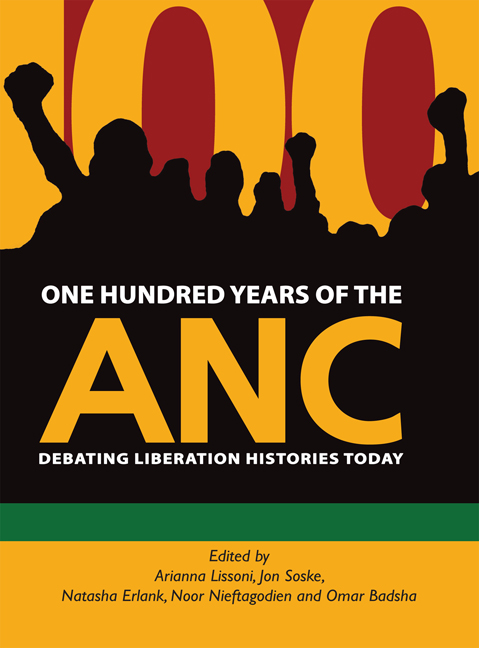Book contents
- Frontmatter
- Contents
- Acknowledgements
- Editorial Note
- FIRST KEYNOTE ADDRESS: Fragmentation and Cohesion in the ANC: The First 70 Years
- SECOND KEYNOTE ADDRESS: A Continuing Search for Identity: Carrying the Burden of History
- Chapter One One Hundred Years of the ANC: Debating Struggle History After Apartheid
- Chapter Two Religion And Resistance In Natal, 1900–1910
- Chapter Three Christianity and African Nationalism in South Africa in the First Half of the Twentieth Century
- Chapter Four Charlotte Maxeke: A Celebrated and Neglected Figure in History
- Chapter Five Imagining the Patriotic Worker: The Idea of ‘Decent Work’ in the ANC's Political Discourse
- Chapter Six Popular Movements, Contentious Spaces and the ANC, 1943–1956
- Chapter Seven Unravelling the 1947 ‘Doctors’ Pact’: Race, Metonymy and the Evasions of Nationalist History
- Chapter Eight The Politics of Language and Chief Albert Luthuli's funeral, 30 July 1967
- Chapter Nine Robben Island University Revisited
- Chapter Ten Shishita: A Crisis in the ANC in Exile in Zambia, 1980–811
- Chapter Eleven Comrade Mzwai
- Chapter Twelve Revisiting Sekhukhuneland: Trajectories of Former UDF Activists in Post-Apartheid South Africa
- Chapter Thirteen Regeneration of ANC Political Power, from the 1994 Electoral Victory to the 2012 Centenary
- Chapter Fourteen The ANC: Party Vanguard of the Black Middle Class?
- Chapter Fifteen Globalisation, Recolonisation and the Paradox of Liberation in Southern Africa
- Contributors
- Index
Chapter Ten - Shishita: A Crisis in the ANC in Exile in Zambia, 1980–811
Published online by Cambridge University Press: 21 April 2018
- Frontmatter
- Contents
- Acknowledgements
- Editorial Note
- FIRST KEYNOTE ADDRESS: Fragmentation and Cohesion in the ANC: The First 70 Years
- SECOND KEYNOTE ADDRESS: A Continuing Search for Identity: Carrying the Burden of History
- Chapter One One Hundred Years of the ANC: Debating Struggle History After Apartheid
- Chapter Two Religion And Resistance In Natal, 1900–1910
- Chapter Three Christianity and African Nationalism in South Africa in the First Half of the Twentieth Century
- Chapter Four Charlotte Maxeke: A Celebrated and Neglected Figure in History
- Chapter Five Imagining the Patriotic Worker: The Idea of ‘Decent Work’ in the ANC's Political Discourse
- Chapter Six Popular Movements, Contentious Spaces and the ANC, 1943–1956
- Chapter Seven Unravelling the 1947 ‘Doctors’ Pact’: Race, Metonymy and the Evasions of Nationalist History
- Chapter Eight The Politics of Language and Chief Albert Luthuli's funeral, 30 July 1967
- Chapter Nine Robben Island University Revisited
- Chapter Ten Shishita: A Crisis in the ANC in Exile in Zambia, 1980–811
- Chapter Eleven Comrade Mzwai
- Chapter Twelve Revisiting Sekhukhuneland: Trajectories of Former UDF Activists in Post-Apartheid South Africa
- Chapter Thirteen Regeneration of ANC Political Power, from the 1994 Electoral Victory to the 2012 Centenary
- Chapter Fourteen The ANC: Party Vanguard of the Black Middle Class?
- Chapter Fifteen Globalisation, Recolonisation and the Paradox of Liberation in Southern Africa
- Contributors
- Index
Summary
There is a danger that the history of the African National Congress (ANC) in exile may be seen as one of perpetual crisis. There were, in fact, only two major crises within the ANC in Zambia during its more than 25 years in the country. The first of these was in 1969 and followed the failure of the Wankie and Sipolilo Campaigns. The second was the so-called Shishita crisis, which began with a foiled Zambian coup plot in October 1980 and spread to the ANC throughout the region.
This chapter seeks to understand what was going on in Zambia at the time and what the ANC, and its intelligence and security department, thought was going on. The chapter concludes with a comparison between the security department's Shishita Report of 1981, with its tendency towards conspiratorial explanations and its identification of criticism of the leadership with subversion, and the very different, and infinitely more critical, Stuart Report (Commission of Inquiry into Recent Developments in the People's Republic of Angola) into the Viana mutiny, the first of the two mutinies that occurred within Umkhonto we Sizwe (MK) in Angola in 1984. This report rejected conspiratorial explanations and examined that mutiny in historical perspective.
It is not suggested that there was necessarily a progressive evolution of ideas about security, subversion and internal democracy in the three years that separated the reports, but the latter, though temporarily obscured by a second mutiny in Angola, did pave the way for the national consultative conference at Kabwe in Zambia in June 1985, which adopted a code of conduct and provided for the establishment for the first time of internal judicial procedures. The conference also recommended, as the report had done, an overhaul of the department of intelligence and security.
The organisers of the failed Zambian coup had hoped to exploit the popular disillusionment that followed the failure of the liberation of Zimbabwe to produce ‘a peace dividend’ for Zambia. Zimbabwe's multiparty elections had also raised questions about democracy in Zambia and about the wisdom of the country's support for the Zimbabwe African People's Union (Zapu), in particular, and of liberation movements in general.
Information
- Type
- Chapter
- Information
- One Hundred Years of the ANCDebating Liberation Histories Today, pp. 233 - 254Publisher: Wits University PressPrint publication year: 2012
